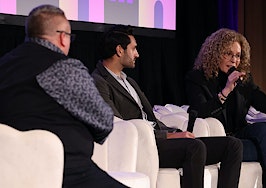Team leader Laura Stewart can remember the days of team recruitment roughly a decade ago when the prevailing mindset of team recruiters was “what can this person do for me?”
Things have changed.
In the post-pandemic real estate market, well-established team leaders are more focused on nurturing talented early-career agents and helping them get a leg up into what can be an unforgiving industry.
“How can I help them? How can I be a mentor to these people versus what can they do for me,” Stewart, the leader of the top Royal-Lepage team in Toronto said at Inman Connect New York on Wednesday.
Moderated by Renee Funk, team leader of The Funk Collective, Stewart spoke on a panel alongside Jonathan Spears of Compass and DJ Ten Hoeve of Ten Hoeve Realty Group on a panel discussion about navigating hiring and team growth.
The panelists agreed that a more difficult real estate market has presented team recruiters with more opportunities as talented early-career agents seek alternatives. A smart team leader will turn that opportunity into increased market share, Ten Hoeve said.
“If you’ve built a good business over the last five to ten years, you have a tremendous opportunity in front of you right now because there’s market share to be taken, and there are great agents who are struggling, who just didn’t know how to run a business or build a business, and there is a way for you to help them,” he said.
Once team members are on board, retaining talent, holding team members accountable and helping them overcome hurdles is as important for team leaders as recruiting.
For Ten Hoeve, this comes in the form of one-on-one meetings with his team members each week to make sure they are staying on track with their goals and monthly happy hours with team members and clients that the New Jersey-based team leader says are an effective way for him to find out things his team members are struggling with.
“I don’t care if anyone comes to the happy hours because my team gets to be there and they get to open up to each other in a social experience that they don’t usually get to do,” he said. “All of a sudden things will find their way out in that environment that then get back to us, and we can solve those problems.”
Stewart said she utilizes monthly one-on-one meetings with her team members to get to know them better. She finds that keeping the meetings consistent is key to gaining a deeper understanding of the people working for her and helping them thrive.
“Over time they do open up to you, and they do start to tell you about their family or their fears or a sickness with a child or something like that. You start to develop these relationships — real relationships with people,” she said.
“Sometimes there’s tears, and it’s not like I’m a therapist, I’m not necessarily skilled at this, but I think it’s just sitting down and understanding what it is that they are looking for from their career, because not all agents are looking for the same thing.”













